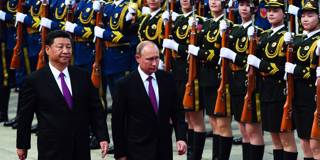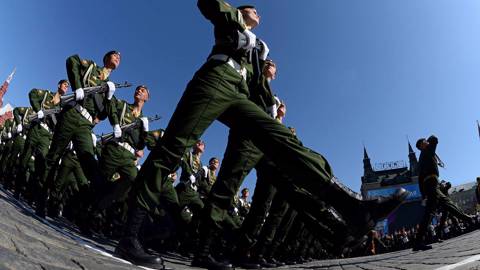By subtly influencing foreign media markets and disseminating sophisticated messages emphasizing the shortcomings of democracy, autocratic regimes have pioneered a new form of foreign policy. In an era of democratic backsliding, Western politicians and Big Tech firms should find this much more concerning than they do.
LOS ANGELES – As authoritarian governments increasingly turn to media operations and propaganda campaigns to influence global public opinion, the information sphere has become an arena of intensifying geopolitical competition. We have entered the age of what I call informational statecraft, defined as a government’s use of media and information tools to spread certain narratives and alter public discourse in support of its strategic goals.
This development is particularly worrying for the world’s democracies. After all, among the most effective practitioners of informational statecraft are China, which is ramping up its foreign propaganda campaigns, and Russia, which has long used disinformation to interfere in Western elections and to justify its revisionist policies, including its invasion of Ukraine.
With informational statecraft, foreign policy is no longer simply a matter of state-to-state diplomacy or even state-led public diplomacy. Owing to the widespread transnational use of digital media platforms, governments and those working on their behalf can easily penetrate foreign media markets and disseminate ideas to a broad audience. These operations can involve everything from paying for ads and hiring social-media influencers to deploying bots and gaming algorithms. Whatever the method, informational statecraft tends to offer far more bang for the buck than multi-billion-dollar fighter jets or destroyers do.
In this new environment, authoritarian regimes’ information campaigns are blurring the lines between official propaganda channels and social media. For example, Chinese officials and state media actively use Facebook and Twitter – which are blocked within China – to reach foreign English-language audiences. Their job, as Chinese President Xi Jinping puts it, is to “tell China’s story well.” Through lucrative content partnerships and paid inserts in mainstream newspapers, Chinese propaganda and state media coverage have appeared in local and national news outlets around the world.
To reclaim what it calls “discourse power,” China’s government has marshaled considerable personnel and financial resources to monitor overseas narratives on social media, and to create networks of fake accounts that amplify government propaganda and disinformation. On particularly sensitive issues such as the origins of COVID-19 or protests in Hong Kong, it has not hesitated to take a page from the Kremlin’s disinformation playbook. Following the international outcry over revelations that China was imprisoning, “re-educating,” and sterilizing Uyghur Muslims en masse, Chinese propagandists produced and disseminated video testimonials of Uyghurs denying that there had been any human-rights abuses.
What do authoritarian information campaigns seek to achieve? While Russia attempts to sow chaos and confusion in democratic systems, China’s rise gives it a growing incentive to tout the superiority of its political system in the face of both internal and foreign criticism. By seeding a global narrative about its ineluctably growing international influence, the Communist Party of China also consolidates its domestic grip on power.
China’s embrace of informational statecraft has occurred in tandem with its new “wolf warrior” diplomacy. In the name of patriotism, Chinese diplomats and officials have been encouraged to criticize other countries aggressively – often browbeating their representatives in public forums – while ardently defending the CPC’s policies.
Much of China’s messaging has focused on the relative performance of democracies versus autocracies. Chinese propagandists have been eager to advance a narrative of “democratic disarray,” highlighting how democratic institutional failings lead to poor governance and less responsiveness to citizens. Chinese state media will jump on any opportunity to emphasize democratic failures, providing blanket coverage of police killings, racial-justice protests, and political riots in the United States.
The supposed superiority of the Chinese model relies on the “autocratic advantage” narrative, which highlights the capacity of centralized government to deliver results faster and more efficiently. Stories that serve this narrative focus on the Chinese government lifting its people out of poverty, exporting economic development to other countries, and donating masks and vaccines to those in need.
In many instances, these messages are more nuanced than one might expect. Rather than arguing explicitly for authoritarianism, they will subtly link key aspects of the Chinese political system (a strong leader, centralized power) to better outcomes. And, recognizing that autocracy is an unpopular brand, official media often portray China’s political system as a form of democracy with Chinese characteristics.
To bolster the credibility of their messaging, authoritarian regimes will also co-opt (genuine or otherwise) Western voices. For example, Chinese media have picked up on Francis Fukuyama’s work criticizing the rigidity and divisions inherent in American democracy, as well as quoting from the bestseller How Democracies Die, by two Harvard political scientists. More insidiously, China often recruits Western social-media influencers – or simply hires Western actors – to promote government talking points and deflect criticism.
These tactics are particularly concerning at a time when authoritarianism is waxing and democratization is waning. Scholars have found that public attitudes and civic culture are critical for the proper functioning of democracy. With countries like China actively extolling the benefits of alternative political systems, people could become more disgruntled with democracy’s shortcomings. They may become more receptive to autocratic leaders who promise to get things done, or even to the prospect of dispensing with free elections altogether.
Authoritarian informational statecraft is already having corrosive effects on democratic systems around the world. Reduced public pressure to safeguard democratic norms and institutions could accelerate what some have called the “democratic recession.” By downplaying the severity of information manipulation and control, major tech companies and political leaders are helping to make the world safer for autocracy.






LOS ANGELES – As authoritarian governments increasingly turn to media operations and propaganda campaigns to influence global public opinion, the information sphere has become an arena of intensifying geopolitical competition. We have entered the age of what I call informational statecraft, defined as a government’s use of media and information tools to spread certain narratives and alter public discourse in support of its strategic goals.
This development is particularly worrying for the world’s democracies. After all, among the most effective practitioners of informational statecraft are China, which is ramping up its foreign propaganda campaigns, and Russia, which has long used disinformation to interfere in Western elections and to justify its revisionist policies, including its invasion of Ukraine.
With informational statecraft, foreign policy is no longer simply a matter of state-to-state diplomacy or even state-led public diplomacy. Owing to the widespread transnational use of digital media platforms, governments and those working on their behalf can easily penetrate foreign media markets and disseminate ideas to a broad audience. These operations can involve everything from paying for ads and hiring social-media influencers to deploying bots and gaming algorithms. Whatever the method, informational statecraft tends to offer far more bang for the buck than multi-billion-dollar fighter jets or destroyers do.
In this new environment, authoritarian regimes’ information campaigns are blurring the lines between official propaganda channels and social media. For example, Chinese officials and state media actively use Facebook and Twitter – which are blocked within China – to reach foreign English-language audiences. Their job, as Chinese President Xi Jinping puts it, is to “tell China’s story well.” Through lucrative content partnerships and paid inserts in mainstream newspapers, Chinese propaganda and state media coverage have appeared in local and national news outlets around the world.
To reclaim what it calls “discourse power,” China’s government has marshaled considerable personnel and financial resources to monitor overseas narratives on social media, and to create networks of fake accounts that amplify government propaganda and disinformation. On particularly sensitive issues such as the origins of COVID-19 or protests in Hong Kong, it has not hesitated to take a page from the Kremlin’s disinformation playbook. Following the international outcry over revelations that China was imprisoning, “re-educating,” and sterilizing Uyghur Muslims en masse, Chinese propagandists produced and disseminated video testimonials of Uyghurs denying that there had been any human-rights abuses.
What do authoritarian information campaigns seek to achieve? While Russia attempts to sow chaos and confusion in democratic systems, China’s rise gives it a growing incentive to tout the superiority of its political system in the face of both internal and foreign criticism. By seeding a global narrative about its ineluctably growing international influence, the Communist Party of China also consolidates its domestic grip on power.
SPRING SALE: Save 40% on all new Digital or Digital Plus subscriptions
Subscribe now to gain greater access to Project Syndicate – including every commentary and our entire On Point suite of subscriber-exclusive content – starting at just $49.99.
Subscribe Now
China’s embrace of informational statecraft has occurred in tandem with its new “wolf warrior” diplomacy. In the name of patriotism, Chinese diplomats and officials have been encouraged to criticize other countries aggressively – often browbeating their representatives in public forums – while ardently defending the CPC’s policies.
Much of China’s messaging has focused on the relative performance of democracies versus autocracies. Chinese propagandists have been eager to advance a narrative of “democratic disarray,” highlighting how democratic institutional failings lead to poor governance and less responsiveness to citizens. Chinese state media will jump on any opportunity to emphasize democratic failures, providing blanket coverage of police killings, racial-justice protests, and political riots in the United States.
The supposed superiority of the Chinese model relies on the “autocratic advantage” narrative, which highlights the capacity of centralized government to deliver results faster and more efficiently. Stories that serve this narrative focus on the Chinese government lifting its people out of poverty, exporting economic development to other countries, and donating masks and vaccines to those in need.
In many instances, these messages are more nuanced than one might expect. Rather than arguing explicitly for authoritarianism, they will subtly link key aspects of the Chinese political system (a strong leader, centralized power) to better outcomes. And, recognizing that autocracy is an unpopular brand, official media often portray China’s political system as a form of democracy with Chinese characteristics.
To bolster the credibility of their messaging, authoritarian regimes will also co-opt (genuine or otherwise) Western voices. For example, Chinese media have picked up on Francis Fukuyama’s work criticizing the rigidity and divisions inherent in American democracy, as well as quoting from the bestseller How Democracies Die, by two Harvard political scientists. More insidiously, China often recruits Western social-media influencers – or simply hires Western actors – to promote government talking points and deflect criticism.
These tactics are particularly concerning at a time when authoritarianism is waxing and democratization is waning. Scholars have found that public attitudes and civic culture are critical for the proper functioning of democracy. With countries like China actively extolling the benefits of alternative political systems, people could become more disgruntled with democracy’s shortcomings. They may become more receptive to autocratic leaders who promise to get things done, or even to the prospect of dispensing with free elections altogether.
Authoritarian informational statecraft is already having corrosive effects on democratic systems around the world. Reduced public pressure to safeguard democratic norms and institutions could accelerate what some have called the “democratic recession.” By downplaying the severity of information manipulation and control, major tech companies and political leaders are helping to make the world safer for autocracy.